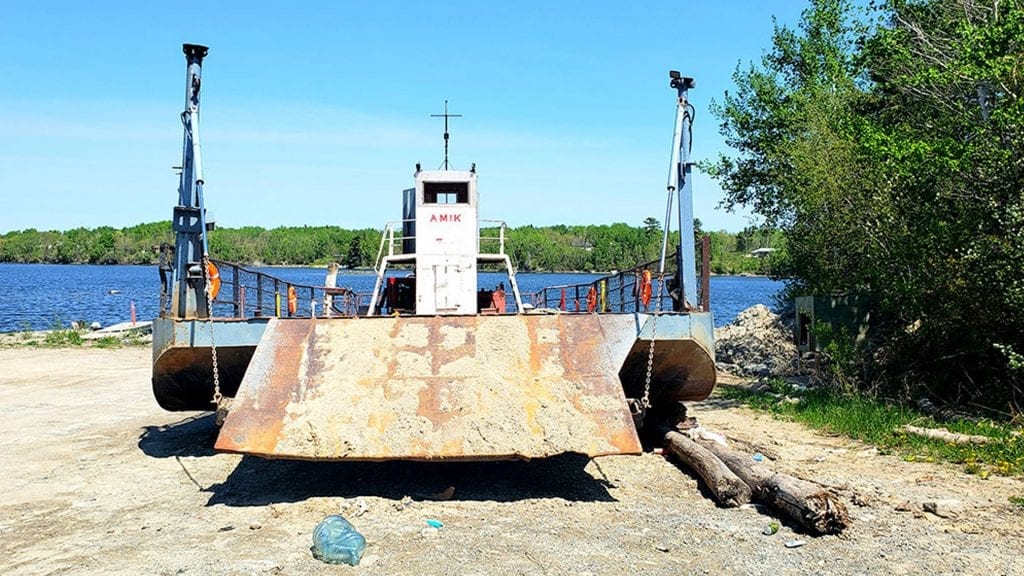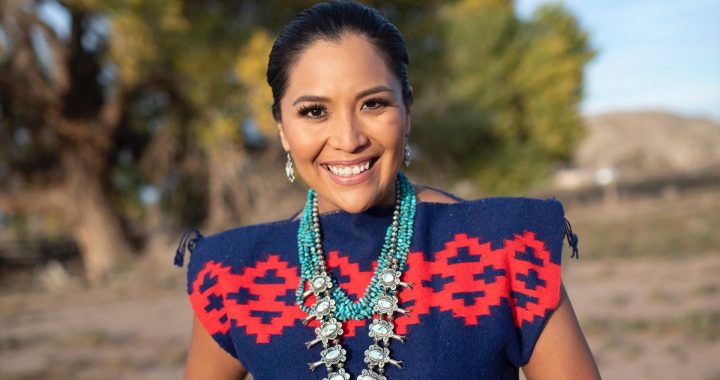
An old barge that would ferry people and goods from Shoal Lake 40 to the mainland. Photo: APTN file
A First Nation, whose lake supplies drinking water to the city of Winnipeg, is suing for a century of alleged damages, according to a statement of claim filed Tuesday.
The 13-page “injurious affection claim” seeks unspecified financial damages to compensate for the “devastating impacts of the Winnipeg aqueduct” that isolated the Anishinaabe community for more than 100 years.
Shoal Lake 40, just east of the Manitoba-Ontario border, was cut off from the mainland in 1915 when the government of Canada expropriated more than 1,215 hectares (3,000 acres) of land for a water transportation system and relocated the-then 100-member community from its traditional village.
The members were forced onto an artificial island while water from their namesake lake was diverted to the Manitoba capital, about 160 km west, via railway, aqueduct and canal.
The “waterworks” trisected its “ancestral lands” and prevented community members from using Shoal Lake for their own drinking water, boating or fishing, the claim alleges. To add insult to injury, the community had to rely on bottled water from 1997 to 2019 after its water treatment plant failed, the claim added.
READ MORE: After 25 years, water advisory in Shoal Lake lifted
“With no access to clean water, the community remained under a boil water advisory – the second longest boil water advisory in Canada – while Winnipeg took water from their front doorstep,” said Chief Kevin Redsky in a news release.
Entering or exiting the community was reduced to travel on ice roads in the winter and boating in the summer.
“For generations, our community members had to make dangerous crossings over water and ice just to do basic things like go to high school or to work,” said Redsky in the release.
“We shouldn’t have had to risk our survival just so Winnipeg could divert water.”
The claim says several members drowned and others nearly died and experienced trauma while falling through the ice while trying to travel to and from the community.
READ MORE: 100 years of force isolation ‘devastating’
It says some members moved away to pursue economic, professional and educational opportunities due to the uncertainty and dangers associated with travel to and from the nation.
The claim alleges the difficulties and high cost of transporting goods to the community made it hard to maintain businesses and provide essential services.
The construction of Freedom Road in 2019 – a 24-km road connecting the community to the Trans-Canada Highway funded by the Ontario and federal governments – made it possible for Shoal Lake to upgrade its water treatment system and, in 2021, the boil water advisory was lifted for the first time in 24 years.
“Our people have done what we must to survive,” Redsky noted in the release. “We’ve had to fight long and hard for the essentials of safe access and clean drinking water.
“We’ve put our survival needs first and now we’re in a position to seek justice and equity for the (alleged) harm that was inflicted on our community for so many years.”
READ THE STATEMENT OF CLAIM HERE
The claim, filed in Ontario Superior Court by First Peoples Law of Vancouver, alleges Canada and the City of Winnipeg never compensated the community “for injurious affection and interference” of its lands and properties.
It further accuses Canada of “breaching its fiduciary obligations” by failing to preserve and protect Shoal Lake’s interests from exploitation and ensure it was compensated.
“On entering into Treaty #3, the Crown promised, inter alia, to set aside reserves for Shoal Lake #40’s use and benefit, and to protect Shoal Lake #40’s rights to hunt, fish and trap through the treaty territory, including in respect of the lands and waters in and around Shoal Lake,” the claim alleges.
“The written English text of Treaty #3 as published by Canada further provides that ‘due compensation’ would be paid to Shoal Lake #40 for the taking or appropriation of reserve lands required for public works.”
Also, the claim alleges the “waterworks” continue to inflict “long-term cultural, economic and social” damages on the community, including members’ ability to maintain their connection and relationship with the lands and waters in and around Shoal Lake … (and) pass on traditions, teachings, practices and cultural knowledge to younger generations.
READ MORE: Waiting for a century: Shoal Lake 40 celebrates Freedom Road
The suit asks the court to order compensation from Canada and Winnipeg, and cover the costs associated with the legal action. None of the allegations have been proven in court.
Canada and Winnipeg have 20 days to file a statement of defence or notice of intent to defend.
A spokesperson told APTN News the City of Winnipeg had not yet been served.









